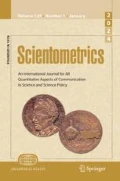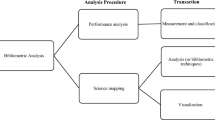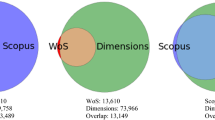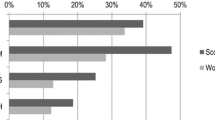Abstract
Using bibliometric techniques, this work investigates the evolution of titles in economics research. It attempts to present a complete and accurate picture of systematic changes in the average character number, syllable number, word number and conceptual diversity in the titles over a long period of time. Based on a total of 338,866 academic paper titles in economics published between 1890 and 2012 from the EconLit and the Web of Knowledge, the economics titles were analyzed from the perspectives of social network, computational phonetics and conceptual diversity. The results showed that in the evolution of this discipline, authors were using increasingly more words for their paper titles and the conceptual diversity in paper titles underwent interesting periodic fluctuations over more than 100 years. The 1970s was a decade that achieved special prominence in conceptual diversity and relational complexity of titles.




Similar content being viewed by others
References
Anthony, L. (2001). Characteristic features of research article titles in computer science. IEEE Transactions on Professional Communication, 44(3), 187–194.
Ball, R. (2009). Scholarly communication in transition: The use of question marks in the titles of scientific articles in medicine, life sciences and physics 1966–2005. Scientometrics, 79(3), 667–679.
Craver, E., & Leijonhufvud, A. (1987). Economics in America: The Continental influence. History of Political Economy, 19(2), 173–182.
de Nooy, W., Mrvar, A., & Batagelj, V. (2011). Exploratory social network analysis with Pajek. Cambridge: Cambridge University Press.
Deardorff, Alan. V. (2013). The terms of trade and other wonders—Deardorff’s Glossary of International Economics. Obtained at http://www-personal.umich.edu/~alandear/glossary/ Accessed 12 Nov 2013.
Diamond, A. M, Jr. (1988). The core journals of economics. Current Contents, 21(1), 4–11.
Divay, M., & Vitale, A. J. (1997). Algorithms for grapheme-phoneme translation for English and French: Applications for database searches and speech synthesis. Computational Linguistics, 23(4), 495–523.
DuBay, W. H. (2004). The principles of readability. Costa Mesa, CA: Impact Information.
EconLit.(2013). Obtained at http://www.ebscohost.com/academic/econlit. Accessed Oct 2013.
Falagas, M. E., Zarkali, A., Karageorgopoulos, D. E., Bardakas, V., & Mavros, M. N. (2013). The impact of article length on the number of future citations: A bibliometric analysis of general medicine journals. PLoS ONE, 8(2), e49476. doi:10.1371/journal.pone.0049476.
Habibzadeh, F., & Yadollahie, M. (2010). Are shorter article titles more attractive for citations? Crosssectional study of 22 scientific journals. Croatian Medical Journal, 51(2), 165–170.
Haslam, N., Ban, L., Kaufmann, L., Loughnan, S., Peters, K., Whelan, J., et al. (2008). What makes an article influential? Predicting impact in social and personality psychology. Scientometrics, 76(1), 169–185.
Jacques, T. S., & Sebire, N. J. (2010). The impact of article titles on citation hits: An analysis of general and specialist medical journals. JRSM Short Reports, 1(1), 2.
Jamali, H. R., & Nikzad, M. (2011). Article title type and its relation with the number of downloads and citations. Scientometrics, 88(2), 653–661.
Journal of Economic Literature (JEL) (2013). JEL Classification System. Obtained at http://www.aeaweb.org/econlit/jelCodes.php?view=jel. Accessed Nov 18 2013.
Jurafsky, D., & Martin, J. H. (2009). Speech and language processing: An introduction to natural language processing, computational linguistics, and speech recognition. Upper Saddle River, NJ: Pearson Education.
Kumar, M. J. (2013). Making your research paper discoverable: Title plays the winning trick. IETE Technical Review, 30(5), 361.
Laxtek. (2013). Stop word list. Obtained at http://www.lextek.com/manuals/onix/stopwords1.html. Accessed 15 Nov 2013.
Milojević, S., Sugimoto, C. R., Yan, E., & Ding, Y. (2011). The cognitive structure of library and information science: Analysis of article title words. Journal of the American Society for Information Science and Technology, 62(10), 1933–1953.
Mitten, R.(1992). A Computer-usable version of Oxford Advanced Learner’s Dictionary of Current English. Oxford Text Archive.
Moore, A. (2010). Do article title attributes influence citations? Wiley-Blackwell Publishing News. Obtained at http://blogs.wiley.com/publishingnews/2010/09/02/do-article-title-attributes-influence-citations/. Accessed 19 Oct 2014.
Paiva, C. E., Lima, J. P. D. S. N., & Paiva, B. S. R. (2012). Articles with short titles describing the results are cited more often. Clinics, 67(5), 509–513.
Porter stemming. (2013). Obtained at http://tartarus.org/martin/PorterStemmer/. Accessed 16 Nov 2013.
Rostami, F., Mohammadpoorasl, A., & Hajizadeh, M. (2014). The effect of characteristics of title on citation rates of articles. Scientometrics, 98(3), 2007–2010.
Ruhl, M. J. (1964). Chemical documents and their titles: Human concept indexing vs. KWIC-machine indexing. American Documentation, 15(2), 136–141.
Sagi, I., & Yechiam, E. (2008). Amusing titles in scientific journals and article citation. Journal of Information Science, 34(5), 680–687.
Scherer, F. M. (2000). The emigration of German-speaking economists after 1933. Journal of Economic Literature, 38(3), 614–626.
Sherman, A. L. (1893). Analytics of literature: A manual for the objective study of English prose and poetry. Boston: Ginn & Co.
Stigler, G. J., Stigler, S. M., & Friedland, C. (1995). The journals of economics. Journal of Political Economy, 103(2), 331–359.
Stremersch, S., Verniers, I., & Verhoef, P. (2007). The quest for citations: Drivers of article impact. Journal of Marketing, 71(3), 171–193.
Subotic, S., & Mukherjee, B. (2014). Short and amusing: The relationship between title characteristics, downloads, and citations in psychology articles. Journal of Information Science, 40(1), 115–124.
The Carnegie Mellon Pronouncing Dictionary (2008). The Carnegie Mellon Pronouncing Dicti-onary. Carnegie Mellon University. Obtained at http://nltk.googlecode.com/svn/trunk/nltk_data/index.xml. Accessed 10 Nov 2013.
van Wesel, M., Wyatt, S., & ten Haaf, J. (2014). What a difference a colon makes: How superficial factors influence subsequent citation. Scientometrics, 98(3), 1601–1615.
Web of Knowledge (Wok). (2013). Obtained at http://wokinfo.com/. Accessed Oct 2013.
Whittaker, J. (1989). Creativity and conformity in science: Titles, keywords and co-word analysis. Social Studies of Science, 19(3), 473–496.
Webster’s Unabridged Dictionary. (1913). Webster’s Unabridged Dictionary. Obtained at http://www.gutenberg.org/ebooks/29765. Accessed 20 Nov 2013.
Acknowledgments
We wish to thank the anonymous reviewers for their helpful comments.
Author information
Authors and Affiliations
Corresponding author
Rights and permissions
About this article
Cite this article
Guo, S., Zhang, G., Ju, Q. et al. The evolution of conceptual diversity in economics titles from 1890 to 2012. Scientometrics 102, 2073–2088 (2015). https://doi.org/10.1007/s11192-014-1501-6
Received:
Published:
Issue Date:
DOI: https://doi.org/10.1007/s11192-014-1501-6




